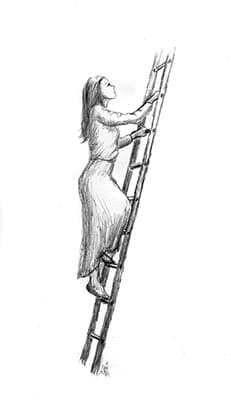Climbing out of darkness
By LORRAINE V. MURRAY | Published August 6, 2015
There is so much anger in our country today. Although some people celebrated the recent Supreme Court ruling on same-sex marriage, orthodox Catholics are concerned about its impact on religious freedom—and vexed about the radical shift in moral definitions.
It’s easy to understand the initial anger, but when this becomes the dominating force in our lives, it can put us in a pretty dark place. You see this happening in social media where people are getting into bitter debates that lead to hard feelings.
From 12 disciples Christianity grew to more than two billion followers today. Were people attracted to the faith because its adherents went around fuming about social changes?
Keep in mind that the night before the crucifixion, Jesus told his friends, “These things I have spoken to you, that my joy may be in you, and your joy may be filled.” As Father Teilhard de Chardin said, “Joy is the infallible sign of the presence of God.”
In college my joyful Christian worldview floundered as I became bewitched by angry philosophies. The atheists were fuming at believers who refused to admit life was meaningless, while the feminists were raging at the patriarchal system. Before long, I became an atheist and a radical feminist—and anger was my daily bread for years.
Eventually, I realized that life without deeper meaning—and without joy—was impossible to sustain, so I climbed my own version of Jacob’s ladder toward the light of faith.
Still, when I returned to Catholicism, I clung to a secular agenda, which rejected church teachings on many social issues. Fortunately, I later sought guidance from a priest, who provided me with material about church teachings to discuss with him—and who was always happy to see me despite our differences.
He helped me to see that Christ, through the Catholic Church, and through natural and nivine laws, is telling us, “Trust me, I know what is best for you.”
Recently, in a homily delivered at the Cathedral of Christ the King, this priest, Msgr. Richard J. Lopez, talked about the Supreme Court decision, enjoining Catholics not to fall into despair.
Instead, he pointed to the example of Catholic nuns during the Civil War who “selflessly and joyfully” took care of the wounded and dying on both sides.
“We must be like those heroic nuns willing to joyfully serve even those who may not like or understand us,” he said. “And we must show the world that keeping the laws of God brings joy and peace.”
When human laws are established that conflict with the laws of God, we shouldn’t play the devil’s game, which feeds on gloom and doom—nor should we reject people with whom we disagree.
In his typical jovial style, Msgr. Lopez mentioned a pastor who had sued a topless bar that had opened near his church.
“I would have gone over and welcomed them to Mass,” Msgr. Lopez said, adding that of course he would have politely suggested that “they did not come in their ‘work clothes.’”
He went on to say, “No matter what lifestyle a person has, or what opinions he or she maintains, I must revere … the image of God in that person.”
I say amen to that because many people who were once pro-choice—and who even had abortions themselves—are now fervently devoted to protecting innocent life. So what happened? In my own case, living according to the world’s standards, rather than God’s, brought only misery.
And, frankly, after returning to Catholicism, I was astonished—and grateful—to discover that the church offered mercy and healing even to someone like me, who had strayed as far as I had.
Converts are often drawn to Christ through relationships with people who are living witnesses to his compassion. As Msgr. Lopez said, “Conversion does not come from harassment and haranguing but from friendship.”
I know this is true because there was something about Msgr. Lopez that drew me to a deeper conversion, even though at first we disagreed on so much. You see, he had something I wanted—and it took me a while to realize what it was.
He had a deep and joyful friendship with Christ, a relationship that could not be shaken by any social upheaval. He was fervently committed to living for Christ—and offered friendship to whomever he met despite differences in beliefs.
Learning to follow Jesus Christ is an ongoing challenge for me, but I know we must seek him in everyone—and try to become Christ for each person we meet. This means putting aside the darkness of anger and instead climbing the ladder toward the light.
Lorraine Murray’s autobiography of Flannery O’Connor, “The Abbess of Andalusia,” and her latest cozy Catholic mystery, “Death Dons a Mask,” are available at amazon.com and barnesandnoble.com. Artwork is by Jef Murray. Readers may contact Lorraine at lorrainevmurray@yahoo.com.